Surviving R Kelly the Impact Come on Again
I f the earth worked as it should, there would never have been a Surviving R Kelly, the documentary series detailing almost three decades of alleged sexual corruption – much of information technology against minors, and almost entirely against young African American women – by the R&B musician. By the time the series, produced by the activist dream hampton, aired on Lifetime terminal January, the allegations against R Kelly had long been public, and mounting. Only it took a six-hour television event to exercise what multiple public lawsuits, highly publicized child sexual abuse images and a trial, a widely circulated tape involving sexual acts with a 14-twelvemonth-old, a bombshell BuzzFeed News article past the reporter Jim DeRogatis, and the #MuteRKelly movement were not able to practise: oestrus simmering public discomfort – or, worse, willful blindness – over the singer'due south conduct into a full boil.
As documented in Surviving R Kelly Part II: The Reckoning, the follow-up that aired on Lifetime this weekend, the first serial landed in a #MeToo media environment with a bang, producing a long-overdue blast of attention on Kelly with legal repercussions. Celebrities from Christina Aguilera to Lady Gaga publicly commended the series, while calls for finally muting Kelly's music skyrocketed; his label, RCA, dropped him, cut off crucial revenue. Kim Foxx, the state's attorney for Kelly's hometown of Chicago, made a public plea for victims to come forrad with data to assist a prosecutorial try; six weeks after the serial aired, Kelly was indicted for 10 counts of sexual abuse. Eighteen federal charges, including for kidnapping, forced labor and sending child sexual abuse images across country lines, followed in August.
All these developments could make it seem as though the long-running case against Kelly achieved, forthcoming trials aside, some sort of resolution. But Surviving R Kelly Part II illustrates with, as in the beginning series, haunting and minimally staged interviews that compiling stories of Kelly'southward abuse on camera was hardly the end. In fact, it'south simply the offset of a different struggle: of moving on, or finding justice, or weathering barbarous backfire. The five-hour series, over again aided by numerous cultural commentators, activists, psychological experts and music industry professionals, builds on the questions that have been asked in post-#MeToo soapbox in 2019, now two years removed from the reporting on Harvey Weinstein that launched an outpouring of public stories of abuse: was information technology worth it? Was coming forward worth the social media harassment, the public scrutiny? Peculiarly confronting a public effigy, especially as blackness women coming against a glory every bit large as Kelly? What culture of complicity immune this to go on so long? And now that Kelly is in custody, what does justice look like?
The backlash

The starting time 2 episodes deal with the series in its own media context: a viral hit which inspired a serious reckoning merely also furious doubtfulness and resistance. The dozens of women who came forwards in the first series, or told their stories on television, in their ain words, for the first time, "have continuously been put on trial themselves", says the activist Brittany Packnett Cunningham. The vitriol online has followed, equally the series describes, a typical script of victim-blaming: what were they wearing? Why put themselves in that state of affairs? What were their parents thinking?
Part II reveals some of the toll this backlash had on Kelly's accusers, and how the resources and fearfulness tactics of a celebrity at his level get into hyperdrive as one'due south visibility rises. At that place's shocking footage of the starting time series'south premiere in New York, which was evacuated over a threat of violence; in the chaos later at the hotel, a representative from Kelly's team allegedly threatened one participant in the evidence, Faith Rodgers, with posting nude photos online as punishment for speaking publicly. Information technology ultimately didn't thing; after the show aired, vigilante pages supporting Kelly popped upwards – one peculiarly vile one endeavored to discredit the women 1 past one with public shaming, mugshots and leaked photos, including ones of Rodgers.
The pressure since the testify aired has been relentless, according to many who spoke in the first serial. Another accuser, Asante McGee, says that in 2019, she just wanted to sleep everything abroad. Kelly may take been arrested, just subsequently the air date, "I felt like nothing," Rodgers says. "I wasn't known as Faith anymore. I'm known equally the girl who slept with R Kelly."
A culture of complicity

"This is not about women finding our voices – nosotros have always had our voices," says Tarana Burke, founder of the #MeToo movement, in the series. "This is about people's ability to hear. We've just finally establish a frequency that people tin hear us."
Women have been using their voices to speak up against Kelly for over ii decades – though, as Part Two points out, the legal system has frequently made information technology hard to exercise so. As with Ronan Farrow'due south Catch and Kill and Jodi Kantor and Megan Twohey'due south She Said, 2 recent books dissecting the Weinstein reporting, Part Two examines how settlements and their attendant not-disclosure agreements became essential tools in protecting abusers.
Two women, Tiffany Hawkins and Lanita Carter, illustrate the pain of enforced silence in heartbreaking particular. Hawkins, the first adult female to charge Kelly of sexual abuse in a lawsuit, in 1996, met Kelly as a latchkey 15-year-old in 1991; she quickly became what he called his "cable girl" – she hooked him upward with several of her xv-year-onetime friends before Kelly turned their relationship sexual. Carter was his hair braider in the early 2000s and, like Hawkins, felt close to Kelly every bit his all-powerful "little sis". When he assaulted her, she called the police force, seeking criminal charges.
Both women's stories and eventual lawsuits were, they remember, largely ignored past government at the time; both ended up settling and signing not-disclosure agreements with a Chicago-based lawyer who, according to DeRogatis, brokered probably a dozen NDA-laced settlements for Kelly, amounting to what he called a "settlement mill".
There'due south the factory of silence, merely as well an unwillingness to listen, or to threaten the cash cow of Kelly'south stardom past confronting his behavior – not subsequently Hawkins'southward lawsuit, or Kelly's marriage to his then 15-year-sometime protege Aaliyah, or when a record showing Kelly urinating on a 14-year-old girl resulted in charges for kid sexual abuse images. 1 former audio engineer who worked with Kelly as he awaited trial for his case, in which he was acquitted in 2008, remembers delivering a 21st altogether cake to the daughter in the tape, who was still living in Kelly's garage at the time. He was aware of girls living in the house but "we weren't supposed to talk to them, they weren't supposed to talk to us", he recalled, though the mood around recording music was unchanged.
' We owe them everything '

The final 2 episodes focus on moving forrard later on the endpoint of the first series – what happened to the girls still under Kelly's control at the time the first serial aired, and what does justice look like for a cast of victims numbering, co-ordinate to DeRogatis, at least 48 women? Office 2 checks in with Dominique Gardner, whose mother whisked her from Kelly'south orbit in 2018, and on the families of Joycelyn Savage and Azriel Clary, ii aspiring singers who both met Kelly when they were 17 and who defended the vocalist in his interview with Gayle King last March. In devastating detail, the Savage and Clary families rebut the stereotypes and hate thrown at them for years by Kelly's defenders and explain how the vocalizer manipulated their daughters against them. Both families, at the time of filming in 2019, hadn't seen their daughters in three or iv years.
Their testimony demonstrates the consequences of an unchecked, well-resourced Kelly. Fifty-fifty as the documentary aired concluding twelvemonth, Kelly's tactics of manipulation – turning the women against their parents, cutting off advice, controlling their whereabouts – continued to wreak havoc on their families. Clary, according to the epilogue, left Kelly'southward circle in Dec but is still supporting him as he prepares for trial. Fell, as of the show'due south air date, remained isolated from her family unit.
Kelly awaits his start trial in Apr, but for viewers the question of justice, and the continuing negotiation over whether to separate the art from the artist, are immediate. As with the fallout from HBO's Finding Neverland'due south claims of abuse by Michael Jackson, in that location's an urgency over how to listen when people say, according to DeRogatis, to "exist aware of the context. Exist aware of what he's really saying in that canon of music. Be enlightened of the hurting he caused to people."
"Subsequently the first, the second, the tertiary, the fourth, the 5th, we could've said, 'No more.' Merely then in that location was the sixth, the seventh, the eighth – we could've stopped it then," says Oronike Odeleye, co-founder of the #MuteRKelly movement. "Then in that location's the ninth, the 10th, the 11th. This has been going on for close to 30 years at present considering of silence." Surviving R Kelly Role Two: The Reckoning argues that there's notwithstanding more than story to tell, and still an obligation to listen – though hopefully nosotros can finally say: no more.
Source: https://www.theguardian.com/music/2020/jan/07/surviving-r-kelly-part-ii-the-reckoning
Postar um comentário for "Surviving R Kelly the Impact Come on Again"